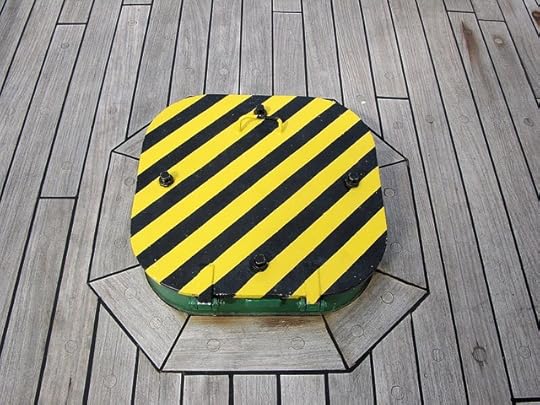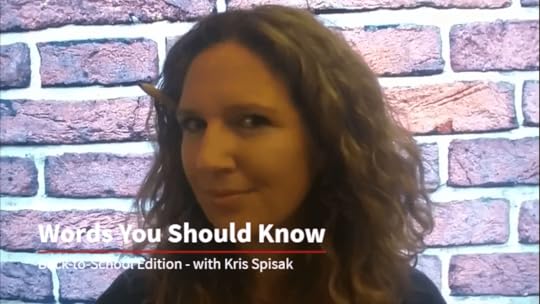Kris Spisak's Blog, page 17
October 9, 2018
Episode 5: Madeleine L’Engle’s Secret Wordplay (and how do you spell “in the (k)nick of time”?)


Just in the (k)nick of time, let’s talk about how you spell that “(k)nick” in the “(k)nick of time.” Is it spelled N-I-C-K or is it K-N-I-C-K? What’s your first reaction? Let’s see if you’re right.
This is episode 5, and I’m having fun with this series of language tips for the curious or confused. I hope you are too. So we’ve talked about Kurt Cobain and Judas Priest. We’ve talked about spelling hijacking and spelling revolutions that didn’t quite catch steam. Today, I want to turn to an expression that is never problematic when you say it but often is when people decide to spell it.
And here’s where I want to begin the conversation:
Episode 5: Madeleine L’Engle’s Secret Wordplay (and how do you spell “in the (k)nick of time”?)
Approximate transcript:
 Who is this Nick we speak of? He must be a time-traveler. No, that doesn’t sound right. It must be “knick of time,” right? Right?
Who is this Nick we speak of? He must be a time-traveler. No, that doesn’t sound right. It must be “knick of time,” right? Right?
Wrong.
Sometimes our brains want to over-complicate things, believing the simple answer can’t be right and that it must be something more profound. In this vein, I’ve seen “nick of time” written a number of ways—“knick of time” and even “gnick of time” among them. However, plain old “nick” is the correct form for this idiom.
Remember:
“Nick” is a name, but “nick” is also the word for a small notch, chip, or wound; the action of making this small notch, chip, or wound; and the action of stealing, among other definitions. The phrase “nick of time” is in reference to a measurement of time, as in a measurement between nicks on a stick.
“Knick” isn’t actually a word. “Knicks” is an abbreviation of “Knickerbockers,” meaning a resident of New York or the pro basketball team. “Knick-knack” is a small ornamental object. “Knickers” is another word for underwear. Somewhere in there, there’s a great “knick of time” story hiding about a buzzer beater shot, nostalgic finds in a grandparent’s attic, or who knows what about time-traveling underwear—but this isn’t what you’re looking for in most situations.
So there you have it. Just in the nick of time, before you misspell this phrase in your next correspondence, you have your answer.
Interestingly, the “nick” of “a nick in time” traces its roots back to the Old English word gehnycned and the Old Norse word hnykla, both meaning “to wrinkle.” If you’re a fan of Madeleine L’Engle‘s A Wrinkle in Time, allow your mind now to be blown.
Aren’t words fascinating?
Join 675+ subscribers and sign-up for my writing and editing email newsletter for more tips like this.
And don’t forget to subscribe to this podcast (via Apple Podcasts, Android, Stitcher, or RSS) so you’ll never miss out on another word you should know. Like what you heard? Rate my show on iTunes.
Contact me today if you have any language questions for a future episode. I’d love to hear from you!
The post Episode 5: Madeleine L’Engle’s Secret Wordplay (and how do you spell “in the (k)nick of time”?) appeared first on Kris Spisak.
October 4, 2018
Writing Tip 361: “Macaroon” vs. “Macaron”


Delicious? Yes. But what on earth do you call this cookie?
Thanks to Cookie Monster, we know “C” is for “cookie,” but there’s so much more we need to learn.
For example, what is the difference between a “macaron” and a “macaroon”? They are both delicious cookies, but they are quite different. One is easy to make; one is not. One is chewy; one has an eggshell-like crust with a meringue inner texture. One has coconut; one has almond flour. Which one is which? After a recent gift from an awesome local bakery, I was determined to get this right.
In case you need a similar reminder:
A “macaron” is the fancy, often colorful sandwich cookie. It’s airy meringue inner texture is surrounded by a delicate crust that crackles upon your first bite, and its middle is a ganache, buttercream, or even sometimes a fruit jam. A macaron is made from almond flour, egg white, and sugar.
A “macaroon” is that simple recipe you might have made with your mother when you were a kid. This lumpy-textured, chewy cookie is incredibly sweet, but that doesn’t stop it from occasionally being dipped in chocolate. A macaroon is made from shredded coconut, egg white, and sugar.
Now, this is where a reader who is paying attention might say that the three-ingredient base of both of these cookies only differs in one ingredient, and this is true.
It turns out, they do have an intertwined background, which makes me feel slightly better for being confused about them for so long.
The original cookie seems to trace back to a flour-less, unleavened cookie in Italy called an amaretti, but when the almond paste of this initial recipe was replaced with coconut, macaroons were born (and Raphael’s cherubs surely applauded. This was Italy after all).
However, the story doesn’t end there. The original recipe with the almond paste also made its way to France, thanks to the chefs of Catherine de Medici who came with her when she left Italy for France. These bakers reinvented it with almond flour, the ingredient that eventually led us to the macarons of today.
Et voilà! The evolution of a cookie never sounded so delicious, non?
Admittedly, Cookie Monster might not have helped you with this one—I’m not sure he’s that particular when it comes to his desserts—but as a fully-grown connoisseur of confectioneries, you now know the difference.
Writing Tip 361.1 – The proper technique for making macarons is apparently so specific that a new word has arisen from it. “Macaronage” is the folding of the ground almonds and sugar into the meringue, a process which, so I’m told, can either make or break the cookie. Pun intended? Absolutely.
Excuse me while I find a big glass of milk…
Join 675+ subscribers and sign-up for my writing and editing email newsletter for more tips like this.
The post Writing Tip 361: “Macaroon” vs. “Macaron” appeared first on Kris Spisak.
October 3, 2018
Episode 4: Should You Trust Judas Priest? “Another Think Coming” or “Another Thing Coming”?

 This is episode 4, and I’ve got another question for you: Is the expression “you’ve got another think coming” or “you’ve got another thing coming”?
This is episode 4, and I’ve got another question for you: Is the expression “you’ve got another think coming” or “you’ve got another thing coming”?
Former President Barack Obama and Judas Priest are tied up in the answer, but before I get to it, I wanted to give a special shout out to my new podcast and newsletter subscribers. I look forward to continuing this word exploration journey with you. You all are awesome, and my next newsletter is coming your way next week.
And about that question…
Episode 4: Should You Trust Judas Priest? (“Another Think Coming” or “Another Thing Coming”?)
Approximate transcript:

There was a time climbing seemed like a good idea, but if this guy thinks he’s getting down easily, he’s got another think coming.
President Obama has gotten it wrong. Judas Priest has gotten it wrong. Your friends have gotten it wrong on social media (or at least mine have). Do you know the correct version of this idiom?
While “you’ve got another thing coming” might sound better to your ear, the expression is actually “you’ve got another think coming.” As in, “if that’s what you think, you’ve got another think coming.”
Does the correct version make a noun-fussy grammarian shudder? Perhaps. But this correct form dates back at least to the early 1910s and possibly before.
H.L. Menken actually uses it as an example of how words switch parts of speech—from verb to noun, in this case—in his 1921 edition of The American Language, though others have remained disquieted by this use of “think” as a noun.
In 1932, M.H. Weseen used “another think” as an example of wordings that simply aren’t correct in his collection, “Words Confused and Misused.” He didn’t say this, offering “thing” up as the better option. Rather, he just didn’t agree with the use of the expression at all.
And I hear you, Mr. Weseen. The evolution of the English language is a bit strange at times. We can’t always just let new words become standard, but this is one instance of a phrase that has become so commonly used that it is, in the twenty-first century, officially okay.
To be fair, the Oxford English Dictionary has been correcting people about this eggcorn since 1919—though it wasn’t until the 1980s that mass confusion seemed to have set in. I’m looking at you, Judas Priest. Heavy metal and heavy influence apparently.
And did I just say “eggcorn”? Yes, I did, that’s an awesome term that refers to a confused word. Imagine saying “acorn” with a deep southern accent. What would you have? Eggcorn. There’s no such thing as an “eggcorn,” but that doesn’t mean that people won’t call “acorns” by that term. You might hear reference to an “escape goat,” but a “scapegoat” is probably the term that speaker is looking for. We don’t “pass mustard,” unless maybe you’re at a picnic, but you might “pass muster.” Eggcorns one and all. Aren’t you happy we have a word for such things?
Meanwhile, how fun is it to connect Barack Obama to Judas Priest? Obama’s mistake was a passing remark, which I can absolutely forgive. He’s an otherwise eloquent speaker. But Judas Priest? It was a hugely popular song title!
We can do better. We absolutely can. But at least you now know the difference.
Plus who needs seven degrees of separation for Obama and Judas Priest? I did it with a single word. You’re welcome.
Join 675+ subscribers and sign-up for my writing and editing email newsletter for more tips like this.
And don’t forget to subscribe to this podcast (via Apple Podcasts, Android, Stitcher, or RSS) so you’ll never miss out on another word you should know. Like what you heard? Rate my show on iTunes.
Contact me today if you have any language questions for a future episode. I’d love to hear from you!
The post Episode 4: Should You Trust Judas Priest? “Another Think Coming” or “Another Thing Coming”? appeared first on Kris Spisak.
September 29, 2018
Episode 3: Franklin, Roosevelt & Getting a Grip on the English Language


This is episode 3 of the Words You Should Know podcast, and it’s time to take a step back. So what am I doing here? Here’s a hint: it’s more than teaching you that you want your football team to have a “disinterested” ref rather than an “uninterested” ref. And this podcast is more than making sure you know whether you should teach your dog to “lay” or “lie” down… though I’ll get back to that second one.
Episode 3: Franklin, Roosevelt & Getting a Grip on the English Language
Approximate transcript:
We all write, folks. We all use words.
And you know what? We all make mistakes. It’s called being human. It’s called being busy, preoccupied, distracted by to-do lists and deadlines and family and technology buzzing all around us. But these details about our lives don’t give us an excuse for sloppiness.
Oh, this is where you might be expecting a grammar police moment, but please let’s step past that. Yelling at each other about comma usage and a misspoken “less” when it should have been a “fewer” doesn’t really solve anything. Yelling don’t solve much, really, so let’s take some time to hash things out. And by that I don’t just mean adding hashtags.
Let’s figure out why “spilled” beans (with an “-ed” on “spilled”) and “spilt” milk (with a “t” on “spilt”) are both okay.
Our language can be disorderly and oftentimes nonsensical, and that’s where this podcast comes from.

English spelling wasn’t greatly standardized before the first printed dictionaries of the 1600 and 1700s. Ever since, writers have struggled to get it right.
People have cared dramatically about the English language and its rules across time, and we need to continue this conversation.
Ben Franklin suggested that we create a new 26 letter alphabet, dropping the letters C, J, Q, W, X, and Y and adding in 6 new ones of his own creation. Of course, Ben Franklin invented new ones. He was Ben Franklin. Now, altogether, this new alphabet would allow, he said, for a phonetic reading of the entire English language.
Inspired by Franklin, though not going quite as far, Noah Webster did simplify a number of traditional spellings in his American Dictionary of the English Language, published in 1828, such as removing the “u” from “color,” “favorite,” and “honor,” and removing the “e” on “ax.” He also reversed the ‘re’ in theater and center. Thus, the differences between American English and British English were born.
But my personal favorite is the story of Teddy Roosevelt’s spelling controversy. Speak softly and carry a big stick wasn’t just a plan of foreign policy, it was also an English language rampage that just never got off the ground, even though Andrew Carnegie, Mark Twain, and Melvil Dewey (yes, of Dewey decimal system fame) were all on the Simplified Spelling Board that again took up the mission to make learning English easier for school children and immigrants, with a desire to make English “the world language of the future.”
Roosevelt issued an order in 1906 that all documents coming from the White House would follow the new spelling system. The matter went all the way to the Supreme Court, and in the end, it was shot down by the House Committee on Appropriations—but not before a heated discussion of why “through” should not be spelled “t-h-r-u.”
A desire for clarity. Order. Simplicity.
I absolutely get those moments, but the English language is a language of rebellion, or maybe I should say freedom. For better or for worse.
Something people forget when they’re getting worked up about things is that our language and its rules and its spelling have changed dramatically many times over. Its why “spilled” and “spilt” both work. Its why an emoji was the Oxford English Dictionary’s word of the year in 2015. Seriously. This is the OED. The Oxford English Dictionary. The face with tears of joy might have made some grammarians have tears of their own—and not always the joyful kind.
The English language is fluid. The rules of today might not hold forever, and new words and phrases are added to the dictionary all the time.
Language exploration and understanding are essential for stronger communication, but not grammar Nazism—may I tell you how much I loathe that wording (“loathe” with an “e” because “l-o-a-t-h” without the “e” means something else entirely)? You can be particular and precise but we must remain respectful, thoughtful, and kindhearted. You can strive to do your best and not point out the mistakes of others. It’s true in language and in life.
Using our words well is about sharing ideas. It’s about changing the world—in big ways or minuscule ways (this is my passing reminder that spelling “minuscule” correctly means that the word “mini” is not actually in it).
Our words let us communicate in every aspect of our lives—work and play, social and familial. The idea of writing shouldn’t scare you. Spelling. Punctuation. Dare I say grammar?
Communication shouldn’t be something we groan about. It’s simply how one human being connects with another. Ideas. Storytelling. Evoking imagery and metaphor and actionable items and mission statements and manifestos. But how do we do all of these things if those who are listening to our words—if those who are reading our words—are distracted or confused by how we arrange them?
I’m not offering the answer that will make the English language easier for all. Should I say I’m no Teddy Roosevelt? But I am offering you reminders of what you know, or what you should know. I’m offering you a chance to do better. Because you can. We all can.
Grammatical perfection is rare—perhaps it’s not even attainable—but elevating our language is doable. I say, let’s start now.
And for those of you with dogs, please teach them the command to “lie down” not “lay down.” Commanding them to “lay down” requires that they be putting something down. Perhaps for the really meticulous among you, you could use “lay it down” instead of “drop it.” But maybe that goes too far.
A friend of Ben Franklin, Mary “Polly” Stevenson, didn’t care for his proposed new alphabet and spelling changes because, she argued, changing these spellings would mean losing the relationship between spelling and etymology, between spelling and the history of words. I absolutely sit in Stevenson’s camp.
There are words we simply should know. Some of them simply require a bit of exploration, and that is what this podcast is all about.
Next week we’re going to hash out the language choices of Judas Priest and a word choice confusion plaguing the world since 1919, or at least that’s when the Oxford English Dictionary got involved.
Until next time…
Words. Language. Communication. Let’s do this.
Join 675+ subscribers and sign-up for my writing and editing email newsletter for more tips like this.
And don’t forget to subscribe to this podcast (via Apple Podcasts, Android, Stitcher, or RSS) so you’ll never miss out on another word you should know. Like what you heard? Rate my show on iTunes.
Contact me today if you have any language questions for a future episode. I’d love to hear from you!
The post Episode 3: Franklin, Roosevelt & Getting a Grip on the English Language appeared first on Kris Spisak.
September 27, 2018
Writing Tip 360: “Button Down” or “Batten Down” the Hatches


A button just isn’t going to help here, folks.
Whether the stormy weather comes from a hurricane, tornado, or simply a boss on a rampage, you need to at least be aware of whether you need to “button down” or “batten down” the hatches. One is the correct idiom. Neither are really something your sewing kit can handle.
This is an idiom that comes from a nautical origin—unlike toeing the line, which many assume has a beginning related with a great heave ho of sails but actually has more to do with where your feet are lined up at the start of a foot race. But that’s another conversion.
Returning to those hatches, a “hatch” is a door of sorts that allows entrance to the lower levels of a boat or ship. Whether those lower levels are for storage, the crew’s quarters, or otherwise, these openings are commonly set into the deck floor, as opposed to a more traditional vertical door.
Often these hatches are made of metal bars for fresh air down below. But then imagine that brewing trouble off on the horizon, the howling winds and the pounding rain. If a big storm is coming, big waves that crash aboard the ship could send water straight through the slats of the hatches, endangering a vessel by taking on too much water.
To “batten down” the hatches is to secure tarpaulins over the gaps, blocking the spaces where water could flow in. When used as an expression in everyday life, it’s simply to prepare for something rough coming your way.
No buttons are involved. No matter your sewing skills, I don’t think anything involving a needle and thread could really help. While I’m intrigued with other possible origin stories if this were the case—a button that survived a typhoon? pressing a button to activate a lock? a darn adorable craft idea on Pinterest?—it’s just not the right word.
Battening down the hatches would have much more success than buttoning them down. And note, we’re not talking about “batons” either.
Everyday expressions are often the ones that trip us up, especially when we hear them said more than we see them written out. But no matter what storms are in your future, at least you’ll know how to spell your preparations.
Join 675+ subscribers and sign-up for my writing and editing email newsletter for more tips like this.
The post Writing Tip 360: “Button Down” or “Batten Down” the Hatches appeared first on Kris Spisak.
September 24, 2018
Episode 2: Is it “wind” or “wend”? (Plus the hijacking of “went”)

 The Words You Should Know podcast. A few stolen minutes out of your day to talk words and communication. This is episode 2, and I’m already loving the feedback I’m getting from you. I appreciate how many of you have already subscribed to my podcast or reached out with questions for future episodes.
The Words You Should Know podcast. A few stolen minutes out of your day to talk words and communication. This is episode 2, and I’m already loving the feedback I’m getting from you. I appreciate how many of you have already subscribed to my podcast or reached out with questions for future episodes.
Without further ado, here’s today’s writing tip for the curious or confused:
Episode 2: “Wind” or “Wend”? (Plus the hijacking of “Went”)
Approximate transcript:
 If you’re in a crowd and you’re trying to get across the room, would you “wind” your way around the other people or would you “wend” your way around them?
If you’re in a crowd and you’re trying to get across the room, would you “wind” your way around the other people or would you “wend” your way around them?
How confident are you in your answer?
And let me ask another question: Have you ever wondered why the past tense of “go” is “went”? No? Well, are you at least a little bit curious now that I pose the question?
Knowing the answer to one will help you with the answer to the other.
It all goes back to a word-hijacking centuries ago, when there were two major terms one could use to denote traveling from place to place. One could “go,” or one could “wend.” “Going” was more direct; “wending” was sometimes less so, but I’ll get back to that.
The confusion between “wind” and “wend” often stems from the fact that people don’t think “wend” is a real word.
But it is. “Wend” is not a typo, and it is the correct word in the idiom “to wend one’s way.”
Yes, it’s a bit old-fashioned, but it pops up enough that it’s worth a conversation.
Here’s the difference between “wind” vs. “wend”:“To wend” is to go in a specified direction often by an indirect route; it is always to move from one place to another.“To wind” (for the sake of this conversation) is to move in a curving line or path.A party guest might wend across a crowded room to get to the bathroom; a detour might wend through lesser-known city streets.
A party guest mind feel like they’re winding in circles mingling with their friends (no clear-cut A to B path); stripes might wind around a ball (they’re curving but not on a mission to get somewhere).
The difference is subtle but present. Admittedly, this is one you have to think about. Using “wend” properly is not for the grammatically faint of heart.
And what about that past tense of “go”?Well, “wend” has fallen out of fashion a few times in its eight-hundred-year history, but its past tense didn’t always recede with it. The past tense of “go” used to be “gaed” or “oede,” depending on one’s geography. The past tense of “wend,” however, was “went,” following the same linguistic pattern as “send” and “sent.” As “wend” fell from popularity, “go” hijacked its past tense. Seriously. Word drama, folks.
Hence now, the past tense of “go” is “went.” Poor “wend” was forced to have a new past tense, “wended,” when it had its revival in everyday speech.
Who said there was anything dull about the history of language?
Join 675+ subscribers and sign-up for my writing and editing email newsletter for more tips like this.
And don’t forget to subscribe to this podcast (via Apple Podcasts, Android, Stitcher, or RSS) so you’ll never miss out on another word you should know. Like what you heard? Rate my show on iTunes.
Contact me today if you have any language questions for a future episode. I’d love to hear from you!
The post Episode 2: Is it “wind” or “wend”? (Plus the hijacking of “went”) appeared first on Kris Spisak.
September 16, 2018
Episode 1: “Never Mind” vs. “Nevermind” (or how Kurt Cobain changed spelling for a generation)

 Here it is, folks. Season one, episode number one of the Words You Should Know Podcast. First came the blog, then came the indie book, then came the traditional publishing deal (shout-out to Get a Grip on Your Grammar, Career Press, 2017). Now, it’s time for my next project.
Here it is, folks. Season one, episode number one of the Words You Should Know Podcast. First came the blog, then came the indie book, then came the traditional publishing deal (shout-out to Get a Grip on Your Grammar, Career Press, 2017). Now, it’s time for my next project.
Words. Language. Communication. Let’s do this thing.
Episode 1: “Never Mind” vs. “Nevermind” (or how Kurt Cobain changed spelling for a generation)
Approximate transcript:
Love him or hate him, but you can partially credit Kurt Cobain for a shift in spelling that has occurred in the past twenty-five or so years around this(these) word(s).

Oh wait, wrong type of nirvana… never mind
What do you think of when you hear, “Smells Like Teen Spirit,” “Come As You Are,” and “Lithium”?
Nevermind. No, I’m not discounting my last question. “Nevermind” was the name of Nirvana’s 1991 album.
What fascinates me is that parallel with this release is the growth of “nevermind” as one word, rather than “never mind,” the two word form. It didn’t start with Kurt Cobain, but there’s a good chance that this album title played a major role in this spelling shift.
The expression “never mind” goes as far back as the 1700s, when the expression “never mind it” became popular. The “it” has simply been dropped over time.
In the present day, “never mind” meanings include:
“much less” or “let alone,” when the word/phrase is used as a conjunction, (e.g., Some don’t give Cobain credit as a musical influence, never mind as a spelling authority).
“forget about it,” “don’t bother,” or “don’t worry about it,” when it’s used as a response, (e.g., What do you think of when you think of Nirvana? A sense of peace? Never mind.)
“Nevermind,” written as one word, began appearing as far back as the 1930s, when the original verb form stemming from “never mind it,” turned into a noun. Here’s where expressions like “It’s no nevermind of yours,” came to be, with “nevermind” being synonymous with “business” or “affair.”
The single-word version has trickled into usage since that time, transitioning into a slang form for the “don’t worry about it,” definition. But just because it is commonly used does not mean that it’s commonly accepted.
Personally, I’ve enjoyed the fact that as I’ve written this post both Microsoft Word and WordPress have flagged my spelling of “nevermind,” when I’ve used it as one word. This stresses my next point:
Always use the two-word form, “never mind,” in formal writing. “Nevermind” is only for casual use.
For essays, business communications, and letters to your grandmother, use “never mind.”
For casual uses like social media—or dare I say character dialogue—I’m completely comfortable with this one word form.
Note, some people argue that “nevermind” is always incorrect. I don’t agree, but it’s an important fact to be aware of.
Am I being a bit of a grammarian rebel by accepting this latter spelling? Perhaps. Is it the influence of Nirvana on my life? Probably not. I just believe there is a time and a place that casual-speak is okay (just like the spelling of “okay,” actually, rather than “OK”).
Interestingly, the Nirvana album “Nevermind,” was almost titled “Sheep.” We can only wonder about the state of “never mind” in the present day if that was the case.
Should we go further into what could have happened with the word “Sheep” if given such a spotlight? Oh, I think I’m going too far. Nevermind.
Join 675+ subscribers and sign-up for my writing and editing email newsletter for more tips like this.
The post Episode 1: “Never Mind” vs. “Nevermind” (or how Kurt Cobain changed spelling for a generation) appeared first on Kris Spisak.
September 13, 2018
Writing Tip 359: “Ye/You” vs. “Thee/Thou” (and the endless pursuit of a plural “you”)

Where I grew up, “y’all” is as everyday as the Appalachian Mountains that surround you like an embrace, but I now have family and friends who cringe a bit at that word. A few even occasionally use “yous,” and I try my best not to shudder, though I realize my own regionalisms probably have the same effect on their ears.
 Honestly, it all comes down to the same problem: When you’re talking to a group of people, what’s the best word to use to make it clear you’re talking to a whole bunch of people? You’re not just talking to Rebecca. You’re talking to her entire department or her entire family.
Honestly, it all comes down to the same problem: When you’re talking to a group of people, what’s the best word to use to make it clear you’re talking to a whole bunch of people? You’re not just talking to Rebecca. You’re talking to her entire department or her entire family.
Maybe you have the Goonies in the back of your head, with Sloth saying “Hey, you guys…” And, again, while it offers an answer, “you guys,” is still not quite right. While many utilize “guys” as a gender-neutral word, it still has a male connotation that doesn’t always sit well.
Slate recently published an article about this problem, arguing for the natural growth of “y’all.” I hear you, Slate. I absolutely do. Y’all have a great argument. In fact, I’m with you. I just don’t see it happening any more than someone living in the Blue Ridge Mountains of Virginia suddenly taking up “yous” in their everyday speech because it offers an answer to the linguistic problem at hand.
There are substitutes that come up, like “everyone,” “team,” and my old favorite “folks,” but I’d like to point out that the English language itself offers up an answer. It’s not one that’s especially modern, but it exists and should at least be a part of this conversation.
Let me remind you about “Ye/You” vs. “Thee/Thou”:
In the English of Shakespeare and the King James Bible, there were multiple versions of the word we now know simply as “you.” There were adjustments for singular or plural, sentence subjects versus sentence objects, and even for levels of respect.
“Thee” was the singular version of today’s word “you,” when it was used as a subject (e.g., “Thee sings so beautifully”; “get thee back to your studies”).
“Thou” was the singular version, when it was used as an object (e.g., I took thou to the castle; he called thou).
If we really want to dive deep here, we can even talk about “thy” and “thine,” which rhyme and function like second person singular versions of “my” and “mine”—or more simply said, they are the equivalent of “your” and “yours” for just one person.
Of course, “thee” and “thou” were also used as word choices of intimacy or as a sign of a lower station or rank. Close confidants would use “thee” and “thou,” as would adults speaking to children and the more powerful speaking to someone lower according to class hierarchies of the day.
“Ye,” could be compared to the French word vous. It is the subject pronoun to use when looking for that plural “you” of today—when you know “y’all” and “yous” aren’t the answer—or when speaking to someone, to whom you need to show respect.
Wow, even talking about respectful language is making me throw in a formal “to whom.” No ending with a preposition today, folks.
Of course, this version of “ye” is not to be confused with the other older version of “ye,” which was a substitute for “the” in the era where T + H was not yet the standard spelling of the “th” sound. (More on that here. You know you’re intrigued.)
“You,” of course, is the word we know and love—or at least that we know and use. Originally, it was designed only as a second person plural object form, but it’s shed its past limitations, hasn’t it?
If we’re going to make a push for more clarity with our plural “you,” I say, why not bring back the “thee/thou/thy/thine” forms to complement it, and let’s throw “ye” back into the conversation. A bit old-fashioned, sure, but there’s thoughtfulness and respect hiding in these old forms that might do good for our communications and society.
Let’s let “you” be “you.” It just needs some company to solve this contemporary problem.
Am I serious? Not completely. But if we’re going to talk about what to do about the plural “you,” let’s at least have the history of “you” as a part of the conversation.
Join 675+ subscribers and sign-up for my writing and editing email newsletter for more tips like this.
The post Writing Tip 359: “Ye/You” vs. “Thee/Thou” (and the endless pursuit of a plural “you”) appeared first on Kris Spisak.
September 6, 2018
Words You Should Know: Back-to-School Edition (video)

Whether you are a student or not, it’s time to step your communication skills up a notch. This is “Words You Should Know: the Back-to-School Edition.” Six questions from six school subjects to challenge your word usage skills.
Are you ready for this?
Join 675+ subscribers and sign-up for my writing and editing email newsletter for more tips like this.
The post Words You Should Know: Back-to-School Edition (video) appeared first on Kris Spisak.
August 30, 2018
Writing Tip 358: “Bring” vs. “Take”

 Bring it on. See what I’m saying here? I’m inviting you to deliver a challenge my way, and I’m ready for it. Today, that challenge just happens to be the usage of “bring” vs. “take.”
Bring it on. See what I’m saying here? I’m inviting you to deliver a challenge my way, and I’m ready for it. Today, that challenge just happens to be the usage of “bring” vs. “take.”
If you need to deliver a book to your neighbor’s, should you “take it next-door” or “bring it next-door”? There is a right answer, whether you’re aware of it or not.
One implies going, and one implies coming.
If you flip it around and your neighbor is returning the book, should she “take it to your house” or “bring it to your house”?
If you’ve known this rule for a long time, more power to you, but for those who aren’t aware:
“Bring” should be used when something is coming “here.” It implies movement toward something.
“Take” should be used when something is going “there.” It implies movement away from something.
Maybe, when you’re playing fetch with your dog, you tell him to “Bring it here.” See? Look at that. You already know which word to use, and your grammatically correct dog is a good listener. Of course, here’s hoping your dog also knows what to do when you tell him to “lie”—not “lay”!—down. (You’ve probably heard me say it before, but someday, I will train a dog to tilt his head to the side and look at people quizzically when people tell him to “lay” down. That’s not the right word choice unless he’s laying down a bone, okay?)
Bring me a question, I’ll take you to the answer—or at least I’ll try. Returning to your book-loving neighbor, you should take a book to her. She lives over there, away from you, so “take” is the right word. When she returns that book, she’ll bring it back to you. Wherever you are serves as the “here,” so “bring” is appropriate in this case.
Bring it, folks. It’s not just smack-talk between Gabrielle Union and Kirsten Dunst in a fabulously cheesy cheerleader movie. It’s my word choice challenge to you.
Though, really, if you answer, “oh, it’s already been broughten,” I’m just going to close my eyes and nod. I’ll take the nostalgia, but, oh man, that line… even in the year 2000, that line got me.
Happy writing, everyone.
Join 675+ subscribers and sign-up for my writing and editing email newsletter for more tips like this.
The post Writing Tip 358: “Bring” vs. “Take” appeared first on Kris Spisak.



